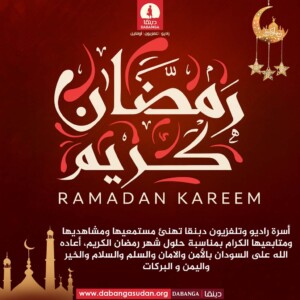Eid El Adha: El Burhan, Hamdok, appeal for unity in Sudan
In messages congratulating Sudanese Muslims on the occasion of Eid El Adha*, the Chairman of Sudan’s Transitional Sovereignty Council, Gen. Abdelfattah El Burhan, and the Prime Minister, Abdallah Hamdok, have appealed for unity in Sudan, to achieve the ideals of the revolution.
 The Chairman of Sudan’s Transitional Sovereignty Council, Gen. Abdelfattah El Burhan, (l) and the Prime Minister, Abdallah Hamdok (Pictures: SUNA)
The Chairman of Sudan’s Transitional Sovereignty Council, Gen. Abdelfattah El Burhan, (l) and the Prime Minister, Abdallah Hamdok (Pictures: SUNA)
In messages congratulating Sudanese Muslims on the occasion of Eid El Adha*, the Chairman of Sudan’s Transitional Sovereignty Council, Gen. Abdelfattah El Burhan, and the Prime Minister, Abdallah Hamdok, have appealed for unity in Sudan, to achieve the ideals of the revolution.
Speaking to the Sudanese nation on Tuesday, El Burhan affirmed his commitment to move forward to achieve the goals of the December revolution, stressing the necessity for “unity among the forces of the revolution as well as the national forces that believe in change, and the principles and aspirations of the people, in freedom, peace, and justice”.
El Burhan lauded the struggle and patience of the Sudanese people for achieving freedom, establishing justice, and spreading peace, adhering to the values and goals of the revolution for which people have sacrificed their lives. El Burhan wished for mercy for the martyrs.
He stressed that confronting the challenges and dangers requires national unity, looking at the higher interests of the state, and the requirements of democratic transformation, indicating that “this will not be achieved except by strengthening national unity, accepting the other, and rejecting the policies of exclusion, fanaticism, regionalism, racism, or partisanship, and rallying around this country”.
El Burhan received congratulatory cables on the occasion of Eid El Adha from the King of Jordan, Abdullah II, the President of Egypt, Abdelfattah El Sisi, the President of Palestine, Mahmoud Abbas, the President of Turkey, Recep Tayyip Erdoğan, the President of the Libyan Presidential Council, Mohamed al-Menfi, the Kuwait Crown Prince, Mishaal Al-Ahmad Al-Jabir Al-Sabah, and Crown Prince of Bahrain, Salman bin Hamad Al-Khalifa.
PM Abdallah Hamdok
In his message for Eid El Adha via social media, Sudan’s Prime Minister, Abdallah Hamdok also called for unity: “I extend my sincere congratulations and love to our honourable people and Muslims everywhere on the occasion of the blessed Eid El Adha. May Allah have mercy on our dead, heal our patients, and reunite the dispersed.” He added, ”One of the forerunners of this happy holiday is the indicators of compatibility between the societal and political components in the states of our beloved East” he concluded.
Addressing the nation on Tuesday, Hamdok described the patience and the efforts being exerted by the Sudanese people to restore their rights of stability and development as “fruitful”.
The PM reviewed the initiative he launched, National Crisis and Transition Issues – The Way Forward, which aims “to achieve the goals the Sudanese people aspire to”.
He indicated that it is an initiative “concerned with developing a national project that can accommodate everyone and complete the tasks of the transition on many levels”.
Hamdok appealed to the public in eastern Sudan to scale up the values of peaceful coexistence, to spread social peace and to work together to address developmental grievances in the east.
* The official Eid El Adha holiday in Sudan began on Sunday, July 18, and will last until Thursday, July 22.
Also known as the, Eid El Adha In the Muslim lunar calendar, Eid El Adha falls on the 10th day of the month of Dhu El Hijjah. It honours the willingness of Ibrahim (Abraham) to sacrifice his son Ismail (Ishmael) as an act of obedience to God’s command. (The Jewish and Christian religions believe that according to Genesis 22:2, Abraham took his son Isaac to sacrifice.) Before Ibrahim could sacrifice his son, however, Allah provided a lamb to sacrifice instead. In commemoration of this intervention, animals are sacrificed ritually. One third of their meat is consumed by the family offering the sacrifice, while the rest is distributed to the poor and needy. Sweets and gifts are given, and extended family are typically visited and welcomed. (Source: Wikipedia)











 and then
and then